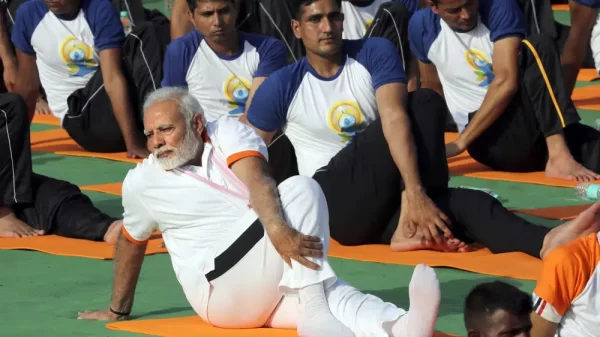FILE – In this Wednesday, Sept. 8, 2010, file photo, Kashmiri separatist leader Syed Ali Shah Geelani waves to the media before his arrest in Srinagar, India. Geelani, an icon of disputed Kashmir’s resistance against Indian rule and a top separatist leader who became the emblem of the region’s defiance against New Delhi, died late Wednesday, Sept, 1, 2021. He was 92. (AP Photo/Altaf Qadri, File)
SRINAGAR, India (AP) — Indian authorities cracked down on public movement and imposed a near-total communications blackout in disputed Kashmir on Thursday after the death of Syed Ali Geelani, a top separatist leader who became the emblem of the region’s defiance against New Delhi.
Geelani, who died late Wednesday at age 92, was buried in a local graveyard in a quiet funeral organized by authorities under harsh restrictions, his son, Naseem Geelani, told The Associated Press. He said the family had planned to bury him at the main martyrs’ graveyard in Srinagar, the region’s main city, as specified in his will but were not allowed to do so by police.
“They snatched his body and forcibly buried him. Nobody from the family was present for his burial. We tried to resist but they overpowered us and even scuffled with women,” Naseem Geelani said.
The Press Trust of India news agency reported that officials buried Geelani’s body and prohibited any mass funeral in anticipation of anti-India protests.
As most Kashmiris remained locked inside their homes, police and soldiers patrolled the tense region. Government forces placed steel barricades and razor wire across many roads, bridges and intersections and set up additional checkpoints in towns and villages in the Kashmir Valley.
Authorities shut down most cellphone networks and mobile internet service in a common tactic employed by India to head off mass protests.
Geelani spearheaded Kashmir’s movement for the right to self-determination and was a staunch proponent of merging Kashmir with Pakistan. He strongly opposed any dialogue with New Delhi, a position rejected by successive Indian governments who often dubbed him a hard-line politician.
Geelani was also the face of Kashmir’s civilian defiance against Indian rule. He led a faction of the All Parties Hurriyat Conference, an association of various Kashmiri political and religious groups that was formed in 1993 to spearhead a movement for the region’s self-determination.
The group used civil disobedience in the form of shutdowns and protests as a tactic to counter Indian rule.
For many in Kashmir and beyond, Geelani was an enduring icon of defiance against India.
Farmer Mohammed Akbar said Geelani’s death filled him with remorse but also anger after he learned that Geelani’s body had been buried by authorities who excluded Kashmiris and his extended family from participating in the last rites.
“They are looking at ways to humiliate us,” Akbar said as he held his grandson in his arms. “They are even scared of dead Geelani.”
Pakistan observed a day of official mourning and flags flew at half staff on orders by Prime Minister Imran Khan. Its foreign ministry condemned the non-public burial by Indian authorities.
“Pakistan strongly condemns the barbaric act of snatching of the mortal remains of the iconic Kashmiri leader” by Indian police, the ministry said in a statement in Islamabad.
It said the Indian government was “so afraid of Syed Geelani and what he stood for that they have now resorted to this inhuman act even after his passing away. This shows the degree of callousness on part of the Occupation Forces.”
Kashmir has long been a flashpoint between India and Pakistan, which both claim the region in full but rule only parts.
Rebels have been fighting against Indian rule since 1989. Most Muslim Kashmiris support the rebel goal that the territory be united either under Pakistani rule or as an independent country.
New Delhi accuses Pakistan of sponsoring Kashmiri militants, a charge Pakistan denies. Tens of thousands of civilians, rebels and government forces have been killed in the conflict.
Tensions flared in the region in 2019 after New Delhi stripped Kashmir’s semi-autonomy, scrapped its statehood and removed inherited protections on land and jobs. Authorities have since brought a slew of new laws, which many critics and Kashmiris liken to the beginning of settler colonialism.
Associated Press writer Munir Ahmed in Islamabad, Pakistan, contributed to this report.
Copyright 2021 Associated Press. All rights reserved.
Source: https://apnews.com/article/india-kashmir-de33936be7dcf5c210d975b638cf428f
